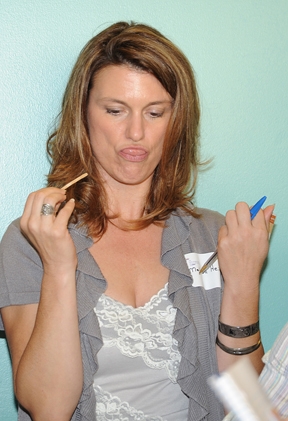- Author: Kathy Keatley Garvey

James R. Carey, professor of entomology at the UC Davis Department of Entomology (the department co-sponsored the event), webcast the six talks presented by either current or retired UC Davis professors. The videos are now on UCTV; here's the link to the Honey! index page.
Did we say "free?" Free.
Carey is a firm believer that UC seminars ought to be shared with not only UC affiliates but with the general public. (Read about how and why he spearheaded the 10-campus project.)
Meanwhile, you can learn about bees from some of the country's best: two UC Davis Department of Entomology faculty and one emeritus. Extension apiculturist Eric Mussen discussed "The Wonder of Honey Bees" and later presented a talk about honey and honey tasting.
Assistant professor Brian Johnson--he researches the behavior, evolution, and genetics of honey bees--covered "Honey Bee Communication: How Bees Use Teamwork to Make Honey" and emeritus professor Norman Gary, a scientist, author and professional bee wrangler, convinced us why we should consider "Hobby Beekeeping in Urban Environments." After all, he's been keeping bees for 64 years!
Then Louis Grivetti, professor emeritus in the nutrition department, strode to the podium to tell us "Historical Uses of Honey as Food"--you won't believe all the things he said in his well-researched talk! Liz Applegate, nutrition professor and director of the Sport Nutrition Program," followed with "Sweet Success: Honey for Better Health and Performance."
By the end of the day, the crowd agreed with Mussen that “Honey bees are truly marvelous.” And with Johnson who pointed out: “Bees have small brains but can solve big problems."
A nice addition: a honey-tasting contest judged by the attendees. The winner? An oh-so-good clover honey from Sacramento Beekeeping Supplies. The honey (yes, it's available for sale at the 2110 X St. business), was produced by the Jones Bee Company, Salt Lake City. Second place went to Alan Pryor of Alameda; and third place, Diane Kriletich of Paloma, Calaveras County.
“It was a sweet day all in all,” said coordinator Clare Hasler-Lewis, executive director of RMI.
Indeed it was!


- Author: Kathy Keatley Garvey
Honey!
That very word summons a smile.
A public celebration--appropriately titled “Honey!”--will take place Friday, Oct. 21 in the UC Davis Conference Center.
Save the date!
The event, sponsored by the Robert Mondavi Institute for Wine and Food Science, will include tastings and a honey-focused lunch.
“Bees play a crucial role on our planet from pollinating to honey creation,” said Clare Hasler-Lewis, executive director of the institute, which is affiliated with the UC Davis College of Agricultural and Environmental Sciences.
The public is invited to “come celebrate with us and enjoy lectures, tastings and displays on honey,” she said.
The event is scheduled to include the history of honey and its use across the ages; honey as a food incorporating honey in your diet; and honey for health, from balancing blood sugar to wound healing.
Among the UC Davis speakers:
--Liz Applegate of the UC Davis Department of Nutrition faculty. A national expert on nutrition and fitness, she will discuss the health benefits of honey.
--Brian Johnson of the UC Davis Department of Entomology faculty. Johnson, who specializes in the behavior, genetics and evolution of honey bees, as well as apiculture, will explore the history of honey use across the ages.
--Extension apiculturist Eric Mussen of the UC Davis Department of Entomology. A nationally known expert on honey bees and honey, he will lead a honey tasting.
As plans progress, additional information will be posted on the Robert Mondavi Institute for Wine and Food Science website, Facebook and on Twitter.
Ah, sweet October!


- Author: Kathy Keatley Garvey
It was delightful hearing UC Davis nutritionist and fitness expert Liz Applegate extol the virtues of honey at the 31st annual Western Apicultural Society (WAS) conference, held recently in Healdsburg.
Like many of you, we've always loved honey. Watching Father tend the bees and extract the honey seemed miraculous. But the end product--the amber-colored honey--this was heaven itself.
Honey, however, is more than just a sweetener.
"I always have my athletes consume honey before and during strenuous exercise,” said Applegate, who directs sports nutrition at UC Davis and serves as nutritionist for the Oakland Raiders.
“I recommend honey--honey should be part of a good refueling strategy,” she said.
“Honey works."
Nationally renowned, Applegate is highly sought as a keynote speaker at industry, athletic and scientific meetings. She holds a doctorate in nutrition science from UC Davis, where she teaches undergraduate nutrition classes that exceed a 2,000 enrollment annually. Her enthusiasm and expertise led to a 2009 UC Davis Distinguished Teaching Award.
But back to the honey.
Honey, a rich source of carbohydrates, “provides a quick source of energy,” Applegate said. It’s easy to carry (in packets), easy to consume (no chewing), easy to digest and is easily assimilated. Plus, it tastes good, is inexpensive and easily obtainable, she noted.
Unlike most other sweeteners, honey contains small amounts of a wide array of vitamins, minerals, amino acids and antioxidants collected from the flowers that bees visit. The list includes niacin, riboflavin, pantothenic acid, calcium, copper, iron, magnesium, manganese, phosphorus, potassium and zinc. Honey is also considered an effective antimicrobial agent, used to treat minor burns and scrapes and to soothe sore throats; and as a beauty agent.
And oh, the honey that's available.
Extension apiculturist Eric Mussen of the UC Davis Department of Entomology faculty and the 2008-09 president of WAS, says more than 300 different kinds of honey are found worldwide. The color, flavor and fragrance are closely linked to the bees’ floral visits.
Show me the honey.



